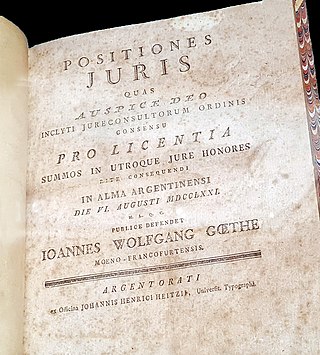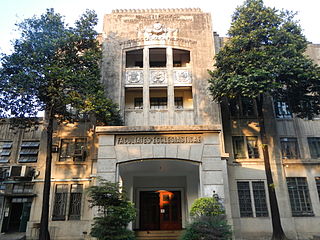Canon law is a set of ordinances and regulations made by ecclesiastical authority for the government of a Christian organization or church and its members.

The Catholic University of America (CUA) is a private Catholic research university in Washington, D.C., United States. It is the only pontifical university of the Catholic Church in the United States and the only institution of higher education founded by the United States Conference of Catholic Bishops. Established in 1887 as a graduate and research center following approval by Pope Leo XIII, the university began offering undergraduate education in 1904. It is classified among "R2: Doctoral Universities – High research activity".
In the canon law of the Catholic Church, a distinction is made between the internal forum, where an act of governance is made without publicity, and the external forum, where the act is public and verifiable. In canon law, internal forum, the realm of conscience, is contrasted with the external or outward forum; thus, a marriage might be null and void in the internal forum, but binding outwardly, i.e., in the external forum, for want of judicial proof to the contrary.
A pontifical university or athenaeum is an ecclesiastical university established or approved directly by the Holy See, composed of three main ecclesiastical faculties and at least one other faculty. These academic institutes deal specifically with Christian revelation and related disciplines, and the Church's mission of spreading the Gospel, as proclaimed in the apostolic constitution Sapientiachristiana. As of 2018, they are governed by the apostolic constitution Veritatis gaudium issued by Pope Francis on 8 December 2017.

A licentiate is an academic degree present in many countries, representing different educational levels. It may be similar to a master's degree when issued by pontifical universities and other universities in Europe, Latin America, and Syria.

The Congregation for Catholic Education (Institutes of Study) (Latin: Congregatio de Institutione Catholica (Studiorum Institutis)) was the pontifical congregation of the Roman Curia responsible for: universities, faculties, institutes and higher schools of study, either ecclesial or non-ecclesiastical dependent on ecclesial persons; and schools and educational institutes depending on ecclesiastical authorities.

Pontifical Catholic University of Peru is a private university in Lima, Peru. It was founded in 1917 with the support and approval of the Catholic church, being the oldest private institution of higher learning in the country.
The Doctor of Sacred Theology, also sometimes known as Professor of Sacred Theology, is the final theological degree in the pontifical university system of the Catholic Church, being the ecclesiastical equivalent of the academic Doctor of Theology (ThD) degree.
Divinity is the study of Christian theology and ministry at a school, divinity school, university, or seminary. The term is sometimes a synonym for theology as an academic, speculative pursuit, and sometimes is used for the study of applied theology and ministry to make a distinction between that and academic theology.
A doctor of both laws, from the Latin doctor utriusque juris, juris utriusque doctor, or doctor juris utriusque, is a scholar who has acquired a doctorate in both civil and church law. The degree was common among Roman Catholic and German scholars of the Middle Ages and early modern times. Today the degree is awarded by the Pontifical Lateran University after a period of six years of study, by the University of Würzburg, and by the University of Fribourg, as well as the University of Cologne.
The canon law of the Catholic Church is "how the Church organizes and governs herself". It is the system of laws and ecclesiastical legal principles made and enforced by the hierarchical authorities of the Catholic Church to regulate its external organization and government and to order and direct the activities of Catholics toward the mission of the Church. It was the first modern Western legal system and is the oldest continuously functioning legal system in the West, while the unique traditions of Eastern Catholic canon law govern the 23 Eastern Catholic particular churches sui iuris.
Licentiate of Canon Law is the title of an advanced graduate degree with canonical effects in the Roman Catholic Church offered by pontifical universities and ecclesiastical faculties of canon law. Licentiate is the title of a person who holds an academic degree called a licence. The licentiate of canon law is the ordinary way for forming future canonists, according to Veritatis gaudium.

David Michael O'Connell is an American Catholic prelate who has served as Bishop of Trenton since 2010. He is a member of the Congregation of the Mission and a past president of the Catholic University of America.

The University of Santo Tomas Faculties of Ecclesiastical Studies are the ecclesiastical schools of the University of Santo Tomas, the oldest and the largest Catholic university in Manila, Philippines.
A pontifical university or athenaeum is a Catholic university established by and directly under the authority of the Holy See. It is licensed to grant academic degrees in sacred faculties, the most important of which are theology, canon law, and philosophy. Pontifical universities follow a European system of degrees in the sacred faculties, granting the baccalaureate, the licentiate, and the doctorate.
An ecclesiastical university is a special type of higher education school recognised by the Canon law of the Catholic Church. It is one of two types of universities recognised, the other type being the Catholic university. Every single ecclesiastical university is a pontifical university, while only a few Catholic universities are pontifical.
Edward Neal Peters is an American Roman Catholic canonist and serves as a referendary of the Apostolic Signatura. In 2023, he is professor of canon law at the Sacred Heart Major Seminary of the Archdiocese of Detroit.
Kurt Martens is a Belgian professor and canon lawyer.
David Patrick Long is an American academic administrator, professor, and Roman Catholic canonist. He currently serves as dean of the School of Professional Studies, adjunct assistant professor in canon law, and director of the Institute for Policy Research and Catholic Studies at The Catholic University of America in Washington, DC.







